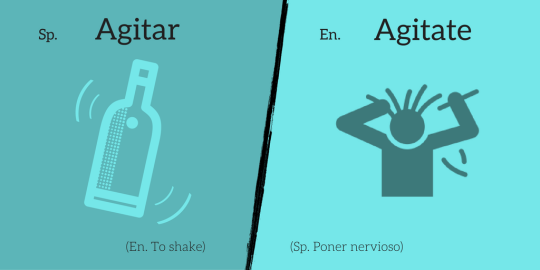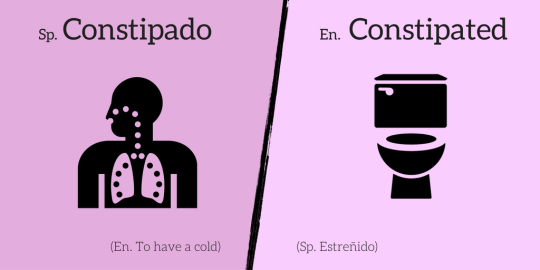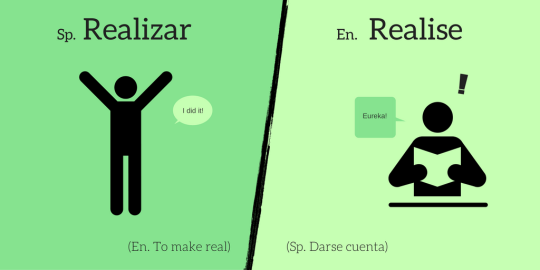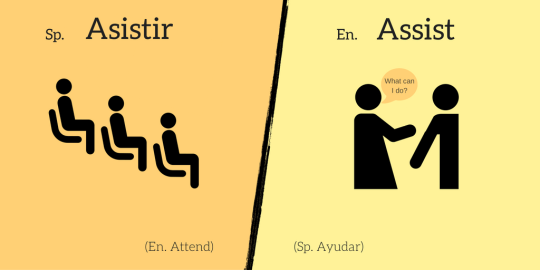Text
8 notes
·
View notes
Text
Random Translations
https://www.europelanguagecafe.com/13-untranslatable-european-words/
Zeg (Georgian) = overmorgen (Dutch) = après-demain (French) = dopodomani (Italian)
The day after tomorrow
Friolero (Spanish) = koukleum (Dutch) = frileux (French) = freddoloso (Italian)
Person sensitive to the cold
Abbiocco (Italian) = Morriña (Spanish)
Person having a food coma
6 notes
·
View notes
Photo

7. Friolero (Spanish)
In Spanish there’s a special word to describe those who are sensitive to cold temperatures and weather: friolero.
0 notes
Text
BONUS: Nervioso ≠ Nervous
Though these words often have the same meaning, many bilingual speakers of Spanish and English are not aware of the subtle difference between these two terms.
Nervous in English is anticipation + fear. That is the only definition.
This is also true of the Spanish ‘nervioso’, except that the word is usually used to describe someone who is unable to stay still, whether for excitement or stress; i.e. their nerves are easily excited. ‘Excitable’ would in some cases be a better translation, though English really doesn’t have a good word for it.
0 notes
Photo

9. Preservativo ≠ Preservative
Second health warning: do not mix these up. Please. Strawberry jam does not prevent pregnancies!
2 notes
·
View notes
Photo

8. Lentillas ≠ Lentils
Health warning: do not put lentils in your eyes. Equally, don’t eat contact lenses.
2 notes
·
View notes
Photo

7. Agitar ≠ Agitate
If a Spanish speaker wants to convey the word ‘agitate’, they are likely to say ‘poner nervioso’ instead. Otherwise they’re just talking about shaking something around.
1 note
·
View note
Photo

6. Introducir ≠ Introduce
It seems so obvious that these words should have the same meaning that you wouldn’t think to ask what it meant. However, don’t try and ‘insert’ (instead of ‘introduce’) your friends. Awkward.
0 notes
Photo

5. Constipado ≠ Constipated
This is one of the most hilarious mix-ups that occurs when Spanish and English meet.
English speaker: How are you today?
Spanish speaker: Ah actually I’m feeling pretty constipated.
English speaker: … umm. TMI.
2 notes
·
View notes
Photo

4. Realizar ≠ Realise
Or at least, they are NOT ALWAYS the same. The Spanish usage of the word refers to ‘making something real’, which in English is most commonly used in this way in the context of ‘realising your dreams’. In any other context, ‘darse cuenta’ is the best translation.
1 note
·
View note
Photo

3. Asistir ≠ Assist
When first asked to ‘assist’ a meeting, a Brit may think that you need help at the meeting while the Spaniard will just expect to turn up.
13 notes
·
View notes
Photo

2. Embarazada ≠ Embarrassed
A classic. It can be an awkward situation if someone just wishes to convey that they feel red-faced, while the listener thinks that they are making an unexpected announcement.
0 notes
Photo

1. Sensible ≠ Sensible
Let’s start with two words that are exactly the same and completely different, at the same time. If you are behaving in a careful, mature way, a Spanish speaker will be confused by the word ‘sensible’…
1 note
·
View note
Text
Mano a mano
What to Know
Mano a mano usually refers to a conflict between two people and directly translates from Spanish to "hand to hand." However, it is sometimes confused with man-to-man, which refers to a frank conversation usually between two men or a one-on-one defensive play.
Meaning of 'Mano a Mano'
We define mano a mano as “in direct competition or conflict especially between two people.” The word comes from Spanish, in which it has the literal meaning of “hand to hand.” Mano a mano comes from bullfighting, describing a type of duel between two matadors.
A keen rivalry developed between Garza and “El Soldado” (“The Soldier”) and they had the honor of fighting “mano a mano,” or “hand to hand,” before a capacity crowd in the ring here while still “novelleros,” or apprentice bullfighters.
— The Ogden Standard-Examiner (Ogden, UT), 11 Dec. 1934
If Manolete and Arruza appear mano a mano, front row tickets probably will be sold at $100 apiece.
— Napa Journal, (Napa, CA), 6 Sept. 1946
However, in part because of the Spanish word for hand (mano) resembling the English word for man (man), some people assume that mano a mano means something closer to man-to-man.
The Rams seldom vary from their tried-and-true zone. And Irvin said he hadn’t seen any teams even try to stop the Dolphins with a man-to-man defense. So why were the Rams caught playing mano-a-mano against the NFL’s Main Man and his Merry Men?
— John Weyler, Los Angeles Times, 15 Dec. 1986
After a full day of competition, the state championship is hanging in the balance of one battle. Andrew Wang and James Lung are squared off, mano a mano - as mano as 10-year-old boys can be, anyway - renewing a budding rivalry between two of the best young players in Massachusetts.
— The Boston Globe, 24 Jun. 2007
"If I'm the coach? No, we're not playing the zone. We're playing man-to-man. Mano a mano. There'd be no doubt about it.”
— The Post-Standard (Syracuse, NY) 4 Apr. 2013
Man-to-man carries a different meaning in English than mano a mano; it is defined as “characterized by frankness and honesty - usually used of a discussion between two men,” or “of, relating to, or being a system of defense (as in football or basketball) in which each defensive player guards a specified opponent.”
The conflation of mano a mano and man to man is not yet common enough that we would consider it a variant meaning and add a new definition. It seems likely that there will continue to be people who use mano a mano and man to man interchangeably for some time to come. If you are one of these people don’t feel bad about it, for English is filled with similar kinds of words and idioms that often seem synonymous, but aren’t.
Other Conflated "Body" Idioms
For instance, head to head seems like it should be the same as tête-à-tête, since tête-à-tête is French for head to head. But head to head is defined as “in a direct confrontation or encounter usually between individuals” and tête-à-tête is “a private conversation between two persons.” And while you may think that toe to toe is similar to cheek to cheek, the former means “facing one another” and the latter simply means “with one another's cheeks touching.” And while cheek by jowl has some similarity to cheek to cheek it should not be confused with neck and neck (which also refers to being close, but is used in the context of a race or contest, rather than, say a dance).
Some people find that knowing the origin of a word helps them to distinguish it from others. If you are one of these people, you may find it easier to keep mano a mano and man to man separated with the knowledge that man comes from the Old English man (“human being”), while mano is traced back to the Latin word manus, meaning “hand.”
Synonyms
eyeball-to-eyeball,
face-to-face,
head-on,
head-to-head,
one-on-one,
toe-to-toe
0 notes
Text
Spanish basic translations 2
something- alguna cosa, algo
somewhere- algun lado, en algún lugar
anything- cualquier cosa
anywhere- en cualquier sitio, dondequiera
nothing- nada, el cero (nothing much- no mucho)
nowhere- en ninguna parte
somewhat- algo, algún tanto
rather- más bien
any- alguna, ninguna, ninguno
a little- un poco
elsewhere- en otra parte
anyway- de todas formas
lack- carecer de
miss- perder
aware- consciente
no more- no más
somehow- de algun modo
anyhow- de todos modos
sometimes- a veces
someone- alguien
slight- leve, ligero, ligera
slightly- ligeramente
still- todavía
always- siempre
around- alrededor, cerca
even- aún, incluso
may- poder, ser posible
would- haría, quería
should- debería
could- podría
however- sin embargo
forever- para siempre (forever & ever- por los siglos de los siglos, forevermore- para siempre jamás)
probably- probablemente
might- podría, poder
perhaps- quizás, tal vez, acaso
alone- sólo, solamente, solo, sola
constant- constante, la constante
constantly- constantemente
wherever- donde quiera
everywhere- En todas partes, por todas partes
everything- todo, toda
every time- cada vez
everyone- todos, todas, toda el mundo, cada uno, cada persona
whenever- cuando, cuando quiera
than- que, de
then- entonces, luego
respect- respectar, el respeto
expect- esperar
believe- creer
hope- espero, la esperanza, esperar (hopefully- Ojalá)
both- ambos, ambas
bother- molestar
effect- efectuar
affect- afectuar
understand- entender, comprender (understood- entendido, comprendido)
together- juntos, junto
0 notes
Text
Spanish Measurement
high/tall- alto, alta
low- bajo, baja
long- largo, larga
short- corto, corta
highest/tallest- mas alto, mas alta
lowest- El mas bajo, La mas baja
longest- El más largo, La más larga
shortest- El mas corto, La mas corta
top- la parte superior, el top (topped- Rematado, rematada)
bottom- el fondo
big- gran, grande
small- pequeño, pequeña
biggest- más grande
smallest- pequeñísimo, pequeñísima
most- más
least- el lo menos, menos
higher- mayor, mas alto, mas alta
lower- más bajo, inferior
maximum- el máximo
minimum- el mínimo
longer- Más, Más tiempo, más largo
smaller- menor, mas pequeño, mas pequeña
bigger- más grande
shorter- Más corta, mas corto
heavy- pesado, pesada
light- ligero, ligera
heavier- Más pesado, Más pesada
lighter- Más ligero, Más ligera
heaviest- El mas pesado, La mas pesada
lightest- El mas ligero, La mas Ligera
average- el promedio
fast- rápido, rápida, ayundar
slow- lento, lenta
faster- mas rapido, mas rapida
slower- mas lento, mas lenta
fastest- lo más rápido, Más rápida
slowest- el más lento, la más lenta
hard- duro, dura
soft- suave, blando
harder- mas duro, mas dura, Más fuerte
softer- mas suave
hardest- el mas duro, la mas dura (toughest)
softest- el mas suave, la mas suave
0 notes